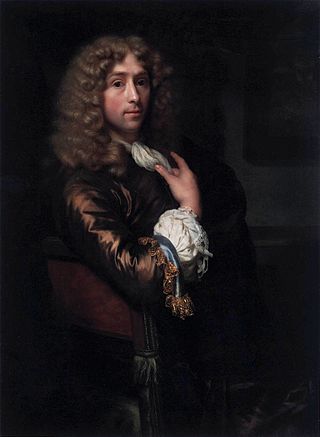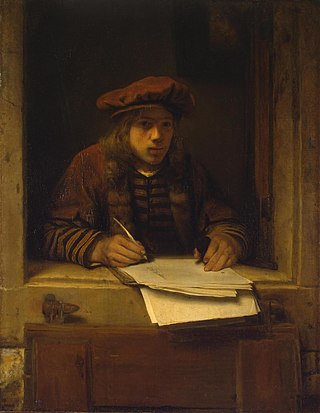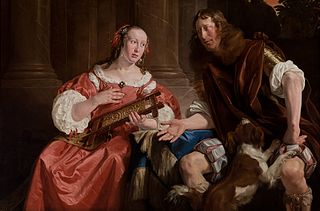
Jan van Hoogstraten (26 January 1628 - 28 July 1654) was a Dutch Golden Age painter who died young in Vienna, where he was living with his older brother Samuel van Hoogstraten.

Jan van Hoogstraten (26 January 1628 - 28 July 1654) was a Dutch Golden Age painter who died young in Vienna, where he was living with his older brother Samuel van Hoogstraten.
Jan van Hoogstraten was born in Dordrecht. According to Houbraken he was the son of the painter Dirk van Hoogstraten and became a master in the Dordrecht Guild of St. Luke in 1649. [1] He travelled with his brother Samuel to Vienna to work at court, and died there at a young age in 1653. [1]
In his biographical sketch of him, Houbraken included a story about his work methods in Vienna, whereby just after he arrived there he had won a commission to paint the Denial of Peter, a popular subject at that time. He had finished the servant girl, and went to the market to find a proper St. Pieter. [1] Not speaking German, he managed to convince a suitable beggar to follow him back to his studio, and the good man thought he would receive alms at the door, but when he was beckoned upstairs and saw the skull and other vanitas attributes set out on a table, he panicked and ran outside, where Samuel van Hoogstraten, just returning and thinking he was a thief, managed to catch him. [1] The townspeople had a good laugh when all was settled, and the poor man was finally convinced to sit in a role as St. Peter, but the whole while he was so frightened and nervous that the painting was well executed indeed. [1] Despite the success of the painting, the poor man refused to sit again for the Hoogstraten brothers, because he felt he had seen death and the devil there. [1]
According to the RKD he is known for landscapes and seascapes. He was in Dordrecht until 1652 and travelled to Vienna, where he died. [2]
He was buried in the St. Stephen's Cathedral, Vienna, where a sculpting friend of Samuel's made a small marble sculpture of a child at his grave, as a monument to his memory. [1] It is unknown whether Jan had accompanied his brother on his trip to Rome beforehand, or that he had remained in Vienna after Samuel's first trip there when his audience with Ferdinand III, Holy Roman Emperor took place on June 23, 1651. [3] Samuel's brother François van Hoogstraten later wrote a poem in memory of Jan, [1] and later named his son after him, who also became a poet. [4]

Salomon van Ruysdael was a Dutch Golden Age landscape painter. He was the uncle of Jacob van Ruisdael.

Nicolaes Pieterszoon Berchem was a highly esteemed and prolific Dutch Golden Age painter of pastoral landscapes, populated with mythological or biblical figures, but also of a number of allegories and genre pieces.

Godfried Schalcken was a Dutch artist who specialized in genre paintings and portraits. Schalcken was noted for his night scenes and mastery in reproducing the effect of candlelight. He painted in the highly polished style of the Leiden fijnschilders.

Samuel Dirksz van Hoogstraten was a Dutch Golden Age painter, who was also a poet and author on art theory.

Jacob de Heusch, was a Dutch painter. He was Willem de Heusch's nephew, signing like his uncle, with an initial monogram combining J, D, and H (substituting an initial J for the initial G of his uncle's Guglielmo.

Jan de Bray was a Dutch Golden Age painter. He lived and worked in Haarlem until the age of 60, when he went bankrupt and moved to Amsterdam.

Gerrit Adriaenszoon Berckheyde was a Dutch Golden Age painter, active in Haarlem, Amsterdam, and The Hague, who is best known today for his cityscapes.

Arnold Houbraken was a Dutch painter and writer from Dordrecht, now remembered mainly as a biographer of Dutch Golden Age painters.

Jan Frans van Douven, or Johan Francois Douven was a Southern Netherlandish portrait painter belonging to the Dutch Leyden School. Born in Roermond, he spent most of his life as Court painter in Düsseldorf, now in Germany, where he created most of his works.

Dirk van Hoogstraten (1596–1640) was a Dutch Golden Age painter, and father of Samuel Dirksz van Hoogstraten.
Jacob Levecq (c.1634–1675), né Jacques L'Evesque, who signed his name J. Leveck or J. L., and was also referred to as Jakob Lavecq, Jacobus Levecq, Jacobus L'Evesque, and Jacobus Lavecq, was a Dutch Golden Age painter trained by Rembrandt.

Abraham Diepraam, or Diepraem, was a Dutch Golden Age painter.
Johannes Gottlieb Glauber, was a Dutch Golden Age painter.

Benjamin Gerritszoon Cuyp or Cuijp was a Dutch Golden Age landscape painter.

Jan Soukens (c.1650–c.1725) was a Dutch Golden Age painter.

Pieter Fris was a Dutch Golden Age landscape painter.
Matthijs Balen was an 18th-century painter from the Dutch Republic.

Jan van Pee, was a Dutch Golden Age art dealer and genre painter.
Francois, or Frans Beeldemaker, was a Dutch Golden Age painter.
Jacob van der Roer van Dordrecht, was a Dutch Golden Age portrait painter.